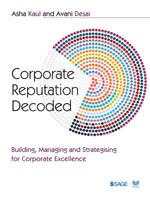| Corporate reputation– A Hammer or a Tool? |  |
|
What is corporate reputation?
Why is it important to build, manage and strategise corporate reputation? |
|
|
|
 | | Forbes | | Reputation Institute’s list measures public perception rather than actual corporate practices. According to Reputation Institute’s data, 85% of consumers say they would definitely buy products sold by a company with a top reputation while only 9% said they would buy from companies with weak reputations. To put the list together, Reputation Institute culls a list of 130 companies from reputation lists it puts together in 30 countries. To be considered for the international list, a company must be well known in the 15 countries surveyed and it must have revenues of more than $6 billion in the U.S. or $1 billion globally. Read the article |
|
| | The success of a company is no longer measured by its financial performance. Companies have begun to realise that it is critical to build a character that commits to integrity and transparency through well-enunciated vision and mission statement.Corporate reputation is a collective assessment of the company’s ability to provide valued outcomes to a representative group of stakeholders. Customers have begun to rely on rankings and ratings, which are viewed as objective measures of assessment, reflection, engagement and action. This rank may be specific to a company attribute or may be an overall score. For instance, it may relate to product/services or may be an aggregate of overall performance on multiple parameters. This ranking of companies is normally done by outside agencies. Read more |
|
|
| Constituents of Corporate Reputation | | Performance + Behaviour + Communication = Sum of images = Reputation |
|
|
|
 |




